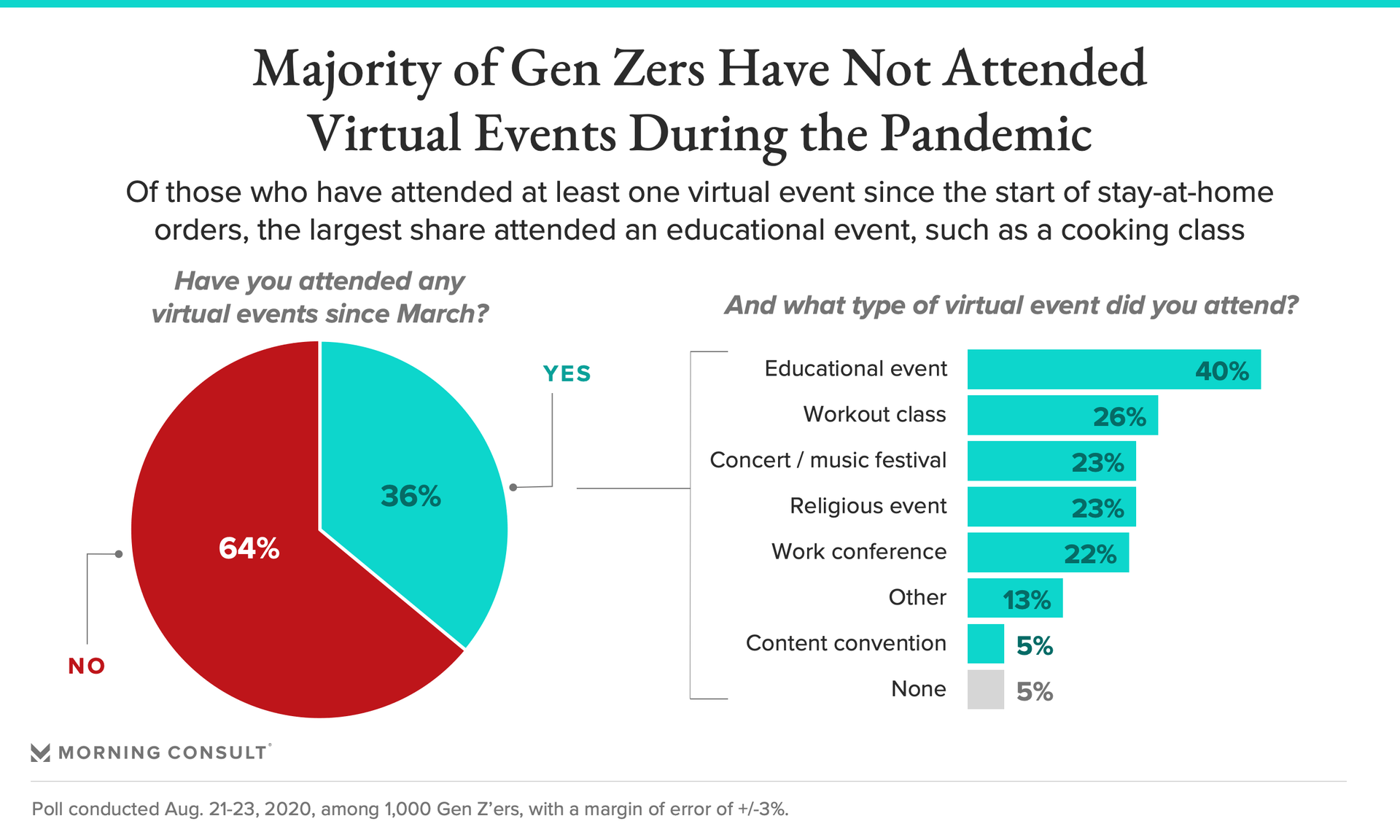With In-Person Gatherings on Hold, Virtual Experiential Marketing Events Have Yet to Fully Captivate Gen Z

When the coronavirus pandemic forced in-person events to grind to a halt in March, the experiential marketing industry was forced to quickly pivot. Experiential agencies adapted by taking their events digital, but brands and marketers might still be missing out on a major demographic when it comes to virtual experiences: Generation Z.

About one-third (36 percent) of Gen Zers have attended a virtual event since March, according to Morning Consult polling, suggesting that much of the always-online demographic has yet to embrace digital replacements for in-person experiences such as concerts and workout classes. The survey was conducted Aug. 21-23 among 1,000 Gen Zers, ages 13-23.
Of those members of the up-and-coming generation who said they attended at least one virtual event, the largest share (40 percent) said they’ve attended an educational event such as a cooking class (although some could be conflating distance learning with this category). About a quarter said they’ve attended virtual versions of an exercise class, a concert or music festival or a religious event.
Experiential marketing professionals suggested several possible explanations for Gen Z’s seeming lack of enthusiasm for virtual events.
Gen Z, native to social media and all things digital, likely expects the highest quality when it comes to video, especially for an event that might eat up hours of their time. And, with a low tolerance for insincerity online, especially from brands, young consumers prefer events with a purpose over experiences designed to sell them something.
“Younger consumers need something more than a web-cam experience,” said John Petrocelli, founder and chief executive of Bulldog Digital Media, a live streaming company that has worked with brands including Spotify Technology SA, AT&T Inc., Coca-Cola Co., the NFL and Taco Bell. “That’s the challenge for brands. To really engage these fans, they need a quality experience and some interaction.”
To captivate young audiences, experiential marketers recommend adding engagement tools such as polling, messaging and sharing features to events. Brands should also strive to make their experiences accessible on the platforms that audiences already prefer, Petrocelli said.
“When platforms like Triller and TikTok start to incorporate more live content onto their platforms, I think resistance from Gen Z will change,” he said.
Brands also need to give Gen Z a reason to attend events — one that’s tied to the brand’s own message and values.
Tonette Griffin, an event producer who specializes in creative and strategic solutions and works at integrated communications and event marketing agency Drury Design Dynamics Inc., said virtual events tied to social causes have proven to be successful with Gen Z audiences over the course of the pandemic.
She pointed to a recent episode of Verzuz, a web series created during the pandemic that features battles between famous musicians, as an example. In an Aug. 31 episode on Instagram Live, R&B legends Brandy and Monica, known for their hit “The Boy Is Mine,” performed against each other and broke the series viewership record, garnering 1.2 million simultaneous viewers at one point during the stream.
The singers weren’t the sole attraction to the event, however. The episode was raising money (a sum that reached $250,000) for When We All Vote, a nonprofit dedicated to increasing participation in elections, and featured calls to action from Democratic vice presidential nominee Kamala Harris and former first lady Michelle Obama.
“Even for millennials and older generations, it’s tough to sign up for a virtual event without being really, really connected to the brand and what their values and mission are,” Griffin said. “Being socially conscious is important today, especially for top brands that are still making regular sales.”
At digital marketing shop AMP Agency, experiential pros have often relied on influencers to draw in Gen Z viewers.
“That’s the language the Gen Z crowd speaks,” said Kat Bryant Flaherty, AMP Agency’s vice president of accounts, who has led experiential programs for brands such as Southwest Airlines Co. and Amazon Kindle. “They’re used to interacting with brands through influencers. They don’t want the brand itself to be selling; they want the influencers to be doing it.”
But brands on a budget need not despair: Celebrities and influencers are just sprinkles for Gen Z consumers, said Derek Knies, director of production at AMP Agency, who has eight years of experience in experiential marketing. The most important aspect of a virtual event for a Gen Zer is feeling like they’re part of the experience, he said, not just passively viewing it.
Even further down the line, when the threat of COVID-19 is less severe, virtual events will likely remain an integral piece of experiential marketing.
Griffin said they might take different forms, with programming becoming leaner to more efficiently capture viewer attention. Petrocelli said they could evolve to serve as a more accessible addition to ticketed, in-person events. Knies and Flaherty also suggested experiential marketing is becoming more of a hybrid between in-person and digital events.
And though people are always going to want to interact face-to-face, “there’s no doubt about it that virtual events are not going away,” Flaherty said.
Alyssa Meyers previously worked at Morning Consult as a reporter covering brands and marketing.
Related content

As Yoon Visits White House, Public Opinion Headwinds Are Swirling at Home

The Salience of Abortion Rights, Which Helped Democrats Mightily in 2022, Has Started to Fade
